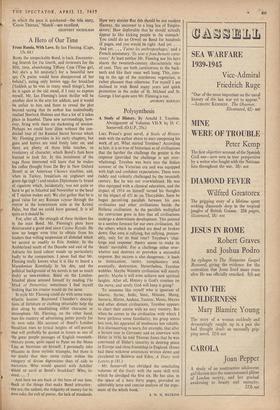A Hero of Our Time
BOND, the unspeakable Bond, is back. Encounter- ing Smersh for the fourth, and reviewers for the
fifth, time, abandoning Tiffany Case (Tine girl,
but she's a bit neurotic') for a beautiful new spy (1`A. purist would have disapproved of her
behind'), eating only brown eggs for breakfast ('faddish as he was in many small things'), here he is again at the old stand, if I may so express myself. Mr. Ian Fleming's latest thriller will be another shot in the arm for addicts, and it would be unfair to him and them to reveal the plot beyond saying that its author has undoubtedly studied Sherlock Holmes and that a lot of it takes place in Istanbul. These new surroundings, how- ever, bring with them no slackening of tension.
Perhaps we could have done without the con- ducted tour of the Russian Secret Service which Mr. Fleming provides in his early chapters, but guns and knives are used freely later on, and there are plenty of those little touches, so revelatory of character, which Bond's fans have learned to look for. In this instalment of the saga those interested will learn that he makes his coffee (bought from De Bry in New Oxford
Street) in an American Chetnex machine, and, when in Turkey, breakfasts on yoghourt and
green figs (ugh !) and smokes Diplomates (a brand of cigarette which, incidentally, was not quite so hard to get in Istanbul last November as the head
of T station makes out). We also gather that he is good value for any Russian voyeur through the mirror in the honeymoon suite at the Kristal Palas, but that we could have guessed. It is all quite as it should be.
For, after all, the strength of these thrillers lies in the man Bond. Mr. Fleming's plots have
deteriorated a good deal since Casino Royale. He
now no longer even tries to obtain from his readers that willing suspension of disbelief which we accord so readily to Eric Ambler. In the Amblerland south of the Danube and east of the Adriatic his local colour stands • up particularly badly to the comparison. I never feel that Mr.
Fleming really knows what it is like to beard a Macedonian Komitadji in, his den, and the
political background of his novels is not so much shaky as non-existent. BOnd on the London- Istanbul plane amused himself by reading The Mask of Demetrios; sometimes 'I find myself wishing that his creator would do the same.
In style Mr. Fleming could do with some trans- atlantic lessons. Raymond Chandler's descrip- tions of furniture or clothing invariably help the plot along by establishing either character or atmosphere. Mr. Fleming, on the other hand, uses his mastery of advertising patter purely for its own sake. His account of • Bond's London breakfast rises to lyrical heights of self-parody and will probably be quoted in future as one of
the great purple passages of English twentieth- century prose, quite equal to Pater on the Mona
Lisa or Newman on himself. I personally take pleasure in these stylistic triumphs, but there is no doubt that they come rather within the category of divine digressions than of aids to narration. Who would quarrel with Achilles' shield or cavil at Bond's breakfast? Who, in- deed. ?
And here we are back at the hero of our time. Back at the things that make Bond attractive : the sex; the sadism, the vulgarity of moneyfor its own sake, the cult of power, the lack of standards. How very sinister that this should be our modern Hannay, the successor to a long line of Empire- Avers!. How deplorable that he should actually appear to like kicking people in the stomach! You could do an Orwell on Bond for hundreds of pages, and you would be right. And yet. . . . And yet. . • ',aline les anthropophages,' said a French missionary. 'Hs sont si franchement carni- vores.' At least neither Mr. Fleming nor his hero shares the twentieth-century characteristic vice of cant. They are both carnivorous to the back- teeth and like their meat well hung. This, com- ing in the age of the murderous vegetarian, is rather pleasant than otherwise.. For myself I am inclined to wish Bond many years and quick promotion in the order of St. Michael and St. George. I feel quite sure Mr. Fleming is too.
ANTHONY HARTLEY


































 Previous page
Previous page